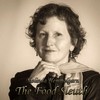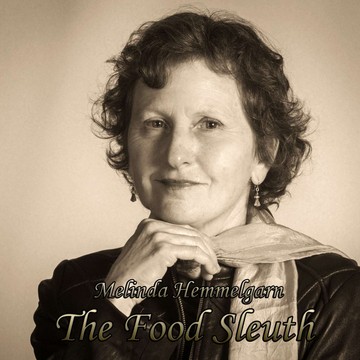

Food Sleuth Radio
Melinda Hemmelgarn
Dietitian Melinda Hemmelgarn helps listeners “think beyond their plates,” connect the dots between food, health and agriculture, and find food truth.
Episodes
Mentioned books

Nov 7, 2022 • 28min
Andrianna Natsoulas, Campaign Director, Don’t Cage Our Oceans
Did you know that large-scale off-shore marine finfish aquaculture operations pose a risk to our ocean commons? Join Food Sleuth Radio host and Registered Dietitian, Melinda Hemmelgarn, for her interview with Andrianna Natsoulas, Campaign Director, Don’t Cage Our Oceans, a national coalition working to protect our ocean commons from the risks of off-shore marine finfish aquaculture operations. Natsoulas describes industrial off-shore aquaculture operations, who profits from them, and the feed and medications that impact both fish quality and our natural ocean environment. Natsoulas also provides tips on choosing sustainable, wild-caught (vs. farmed) fish.Related website: https://dontcageouroceans.org/

Oct 28, 2022 • 28min
Aaron Johnson, Program Manager for Challenging Corporate Power at Rural Advancement Foundational International – USA (RAFI-USA.)
Did you know that most poultry sold in supermarkets is produced by an unjust “tournament system” that pits farmer against farmer? Join Food Sleuth Radio host and Registered Dietitian, Melinda Hemmelgarn, for her interview with Aaron Johnson, Program Manager for Challenging Corporate Power at Rural Advancement Foundational International – USA (RAFI-USA), a non-profit organization based in North Carolina that challenges the root causes of unjust food systems, and supports and advocates for economically, racially, and ecologically just farm communities. Johnson describes vertical integration within the poultry industry, how “tournament systems” exploit poultry farmers, and how banks and taxpayers support this unjust system. Importantly, Johnson helps us rethink cultural narratives on regulation. The film, “Under Contract,” takes us behind the scenes to understand the lives of contract poultry farmers: https://rafiusa.org/undercontractfilm/Related website: https://www.rafiusa.org/programs/challenging-corporate-power/

Oct 20, 2022 • 28min
Lauren Swann, MS, RD, food labeling expert
Did you know that most food labels are tightly regulated by FDA? Join Food Sleuth Radio host and Registered Dietitian, Melinda Hemmelgarn, for her interview with Lauren Swann, Registered Dietitian and food label regulation expert. The two will discuss areas of confusion, trends, and the finer points of evolving food labels and their role in consumer education, marketing, and protecting public health. For FDA labeling information see: https://www.fda.gov/food/food-labeling-nutrition.Related website: Food & Nutrition Label; Dietary Supplement & Menu Labeling & Advertising: https://www.linkedin.com/groups/158141/

Oct 13, 2022 • 28min
Taylor Brorby, essayist, poet, environmentalist, and author of Boys and Oil: Growing up Gay in a Fractured Land.
Did you know that fracking, and other methods of fossil fuel extraction and production puts farm land, water quality and public health at risk? Join Food Sleuth Radio host and Registered Dietitian, Melinda Hemmelgarn, for her interview with Taylor Brorby, author, poet, essayist, environmentalist and author of Boys and Oil: Growing up Gay in a Fractured Land. Brorby discusses the impact of the expansion of the fossil fuel industry into his home state of North Dakota, the calculated pitting of pipeline supporters against environmentalists, and his essay in Orion Magazine https://orionmagazine.org/article/diabetes-disability-fossil-fuels/ which brings into focus the relationship between personal and planetary health.Related website: www.taylorbrorby.com

Oct 7, 2022 • 28min
Manny Teodoro, Ph.D., lead author of The Profits of Distrust: Citizen-Consumers, Drinking Water, and the Crisis of Confidence in American Government.
Did you know that bottled water purchases can predict political involvement? Join Food Sleuth Radio host and Registered Dietitian, Melinda Hemmelgarn, for her interview with Manny Teodoro, Ph.D., Associate Professor of Public Affairs at the University of Wisconsin-Madison and lead author of The Profits of Distrust: Citizen-Consumers, Drinking Water, and the Crisis of Confidence in American Government. Teodoro discusses the connections between the rise of the commercial drinking water industry, distrust in and failure of government, and broader withdrawal from civic life. Teodoro has served on expert advisory panels to state governments, UNICEF/World Health Organization, the American Water Works Association, and dozens of local governments. He works directly with government, community, and industry leaders to improve water affordability, equity, and regulatory implementation. He is a member of the Water and Health Advisory Council: https://wateradvisory.org/ and addressed the Third Coast Water Conference (3/31/21), speaking on “Confidence in American institutions and the Rise of Bottled Water”: https://www.youtube.com/watch?v=9OL8R0082OsRelated website: www.mannyteodoro.com

Sep 30, 2022 • 28min
Ramon Velazquez, Ph.D., researcher at the Neurodegenerative Disease Research Center at Arizona State University, discusses brain health and the herbicide glyphosate’s ability to increase neuroinflammatory compounds.
Did you know that the herbicide glyphosate can cross the blood-brain barrier, resulting in an increase of neuro-inflammation? Join Food Sleuth Radio host and Registered Dietitian, Melinda Hemmelgarn, for her interview with Ramon Velazquez, Ph.D., Assistant Professor in the School of Life Sciences, and Neurodegenerative Disease Research Center at the Biodesign Institute, Arizona State University. Velaquez discusses his new published research on the effects of glyphosate on the brains of mice, showing that it may increase the risk of neurodegenerative disorders. “Glyphosate infiltrates the brain and increases pro-inflammatory cytokine TNFα: implications for neurodegenerative disorders.” https://pubmed.ncbi.nlm.nih.gov/35897073/ He also discusses the role of choline in cognitive health and how it may reduce the risk of Alzheimer’s Disease.Related website: https://velazquezlab-asu.github.io/index.html

Sep 22, 2022 • 28min
Bart Elmore, Ph.D., environmental historian at the Ohio State University and author of Seed Money: Monsanto’s Past and Our Food Future.
Did you know that Monsanto knew PCBs were harmful to public health, but continued to profit from their sale? Join Food Sleuth Radio host and Registered Dietitian, Melinda Hemmelgarn, for her interview with Bart Elmore, Ph.D., Associate Professor of Environmental History, core faculty member of the Sustainability Institute at the Ohio State University, and award-winning author of Citizen Coke: The Making of Coca-Cola Capitalism (W. W. Norton, 2015) and Seed Money: Monsanto’s Past and Our Food Future(W. W. Norton, 2021). Elmore describes how he gained access to archival documents showing how Monsanto (now owned by Bayer) profited by exploiting labor and natural resources, and continues to do so today with GMO crops designed to sell an increasing number of damaging herbicides. Related website: https://www.bartelmore.com/

Sep 15, 2022 • 28min
Jenn Wheeling, holistic rancher, regenerative farmer
Did you know that pasture-based animal agriculture differs vastly from industrial feedlots? Join Food Sleuth Radio host and Registered Dietitian, Melinda Hemmelgarn, for her interview with Jenn Wheeling, holistic rancher and regenerative farmer. Wheeling is one of several siblings who live and operate agricultural enterprises on James Ranch in Durango, CO. She describes a resilient regional food system that feeds her community and contributes to the region’s environmental and economic well-being.Related website: https://jamesranch.net/

Sep 8, 2022 • 28min
Barry Boyd, MD, MS, integrative oncologist
Did you know that insulin resistance increases risk for chronic diseases? Join Food Sleuth Radio host and Registered Dietitian, Melinda Hemmelgarn, for her interview with Barry Boyd, MD, MS, integrative oncologist and Assistant Professor of Medicine at the Yale Cancer Center. Boyd discusses his focus on nutritional support in cancer prevention and treatment, insulin resistance and glyphosate-related cancers.Related website: https://journals.sagepub.com/doi/pdf/10.1177/1534735403259152

Sep 2, 2022 • 28min
Joshua David Stein, author of “Lunch from Home.”
Did you know that children who bring non-traditional foods in their lunch boxes can face bullying at school? Join Food Sleuth Radio host and Registered Dietitian, Melinda Hemmelgarn, for her interview with Joshua David Stein, food writer, restaurant critic, and children’s book author. Stein describes his work writing and performing children’s books. Lunch From Home, his most recent title, describes “lunch box moments” as faced by the lead characters (real professional chefs) when they were children. Stein explores the sensitive topics of cultural foods and how children react to “strange” food. A perfect back-to-school read to help children navigate their school cafeterias, embrace cultural differences and explore ethnic foods.Related website: https://www.thebandbooks.com/; www.joshuadavidstein.com


